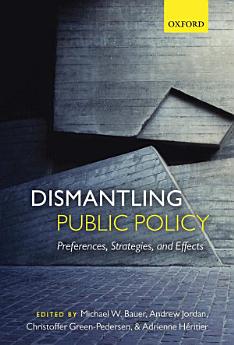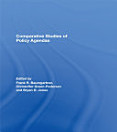Dismantling Public Policy: Preferences, Strategies, and Effects
Michael W. Bauer · Christoffer Green-Pedersen · Adrienne Héritier · Andrew Jordan
2012. g. dec. · OUP Oxford
E-grāmata
248
Lappuses
family_home
Piemērota
info
reportAtsauksmes un vērtējumi nav pārbaudīti. Uzzināt vairāk
Par šo e-grāmatu
Policy dismantling is a distinctive form of policy change, which involves the cutting, reduction, diminution or complete removal of existing policies. The perceived need to dismantle existing policies normally acquires particular poignancy during periods of acute economic austerity. Dismantling is thought to be especially productive of political conflict, pitting those who benefit from the status quo against those who, for whatever reason, seek change. However, scholars of public policy have been rather slow to offer a comprehensive account of the precise conditions under which particular aspects of policy are dismantled, grounded in systematic empirical analysis. Although our overall understanding of what causes policy to change has accelerated a lot in recent decades, there remains a bias towards the study of either policy expansion or policy stability. Dismantling does not even merit a mention in most public policy textbooks. Yet without an account of both expansion and dismantling, our understanding of policy change in general, and the politics surrounding the cutting of existing policies, will remain frustratingly incomplete. This book seeks to develop a more comparative approach to understanding policy dismantling, by looking in greater detail at the dynamics of cutting in two different policy fields: one (social policy) which has been subjected to study before and the other (environmental policy) which has not. On the basis of a systematic analysis of the existing literatures in these two fields, it develops a new analytical framework for measuring and explaining policy dismantling. Through an analysis of six, fresh empirical cases of dismantling written by leading experts, it reveals a more nuanced picture of change, focusing on what actually motivates actors to dismantle, the strategies they use to secure their objectives and the politically significant effects they ultimately generate. Dismantling Public Policy is essential reading for anyone wanting to better understand a hugely important facet of contemporary policy and politics. It will inform a range of student courses in comparative public policy, politics, social and environmental policy.
Par autoru
Michael W. Bauer works on issues of European and multilevel public administration and is interested in comparative public policy analysis in particular in the European Union. He is Professor of Politics and Public Administration at the Humboldt-Universität zu Berlin, Germany. Andrew Jordan is interested in the governance of environmental problems in different context, but specially the European Union. He is Professor of Environmental Politics in the Tyndall Centre for Climate Change Research, School of Environmental Sciences, University of East Anglia, United Kingdom. Christoffer Green-Pedersen has a long-time interest in the comparative politics of welfare state reforms. His recent research focuses on comparative political agenda-setting. He is Professor of Public Policy at the Department of Political Science, Aarhus University. Adrienne Héritier's research extends to theories of institutional change in the European Union, comparative public policy, European policy making, Europeanization, regulation and new modes of governance. She is Professor of political science in the Dept of Political and Social Science and the Robert Schuman Center for Advanced Studies, European University Institute, Florence.
Novērtējiet šo e-grāmatu
Izsakiet savu viedokli!
Informācija lasīšanai
Viedtālruņi un planšetdatori
Instalējiet lietotni Google Play grāmatas Android ierīcēm un iPad planšetdatoriem/iPhone tālruņiem. Lietotne tiks automātiski sinhronizēta ar jūsu kontu un ļaus lasīt saturu tiešsaistē vai bezsaistē neatkarīgi no jūsu atrašanās vietas.
Klēpjdatori un galddatori
Varat klausīties pakalpojumā Google Play iegādātās audiogrāmatas, izmantojot datora tīmekļa pārlūkprogrammu.
E-lasītāji un citas ierīces
Lai lasītu grāmatas tādās elektroniskās tintes ierīcēs kā Kobo e-lasītāji, nepieciešams lejupielādēt failu un pārsūtīt to uz savu ierīci. Izpildiet palīdzības centrā sniegtos detalizētos norādījumus, lai pārsūtītu failus uz atbalstītiem e-lasītājiem.







